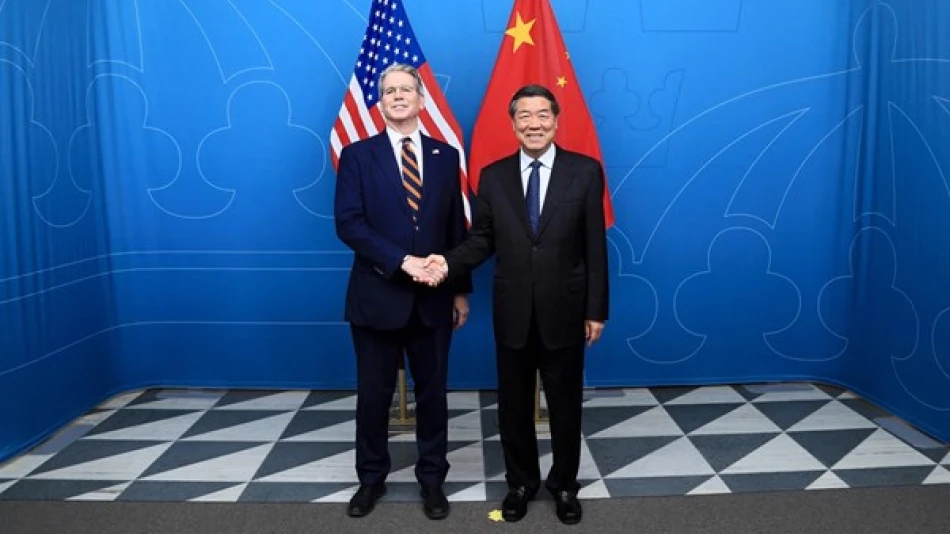
US-China Trade Talks Conclude First Day: Crucial Negotiations Underway
US-China Trade War Enters Critical Phase as Third Round of Tariff Negotiations Resume in Stockholm
The United States and China concluded the first day of their third round of high-stakes tariff negotiations in Stockholm, with talks set to resume Tuesday as both economic superpowers race against an August 12 deadline that could trigger a devastating escalation in their trade war. The negotiations come amid Trump's aggressive tariff strategy that has already imposed 15% duties on EU imports and threatens to reshape global trade relationships.
High-Level Diplomatic Push Under Time Pressure
US Treasury Secretary Scott Bessent led the American delegation, while Chinese Deputy Prime Minister He Lifeng headed Beijing's negotiating team. The talks, hosted by Sweden's Prime Minister at the Rosenbad building, concluded around 7:50 PM local time on Monday, according to a US Treasury spokesperson.
The timing is crucial. Both sides are operating under a 90-day truce agreement reached during Geneva talks in May, which temporarily reduced US tariffs to 30% and Chinese retaliatory tariffs to 10%. When this ceasefire expires on August 12, tariffs could snap back to the punitive levels seen in April, when both countries imposed duties reaching triple-digit percentages on each other's goods.
China Signals Diplomatic Flexibility
Beijing appeared to strike a conciliatory tone ahead of the negotiations, with Foreign Ministry spokesperson Guo Jiakun emphasizing hopes for talks based on "mutual respect and reciprocal treatment." His statement reflected China's desire to "enhance consensus through dialogue and communication, reduce misunderstandings, consolidate cooperation, and promote stable, healthy, and sustainable development of China-US relations."
This diplomatic language suggests China may be feeling pressure from the economic impact of prolonged trade tensions, particularly as Trump's tariff threats extend beyond bilateral disputes to encompass a broader reshaping of America's trade relationships.
Trump's Expanding Tariff Arsenal
The China negotiations occur against the backdrop of Trump's increasingly aggressive trade posture. His recent 15% tariff on EU imports demonstrates a willingness to open multiple trade fronts simultaneously, a strategy that could strengthen his negotiating position with Beijing by showing that China isn't receiving special treatment.
More concerning for emerging markets, Trump has threatened countries like Brazil and India with tariff increases from the current "basic level" of 10% to as high as 50%. This escalation pattern suggests the administration views tariffs not just as negotiating tools but as fundamental instruments of economic policy.
Market Implications and Global Ripple Effects
The Stockholm talks carry enormous implications for global markets and supply chains. A failure to reach agreement could trigger the return of devastating tariff levels that disrupted trade flows and corporate planning throughout 2024. The automotive, technology, and agricultural sectors remain particularly vulnerable to renewed escalation.
For investors, the negotiations represent a critical inflection point. Success could unleash pent-up demand and investment that has been delayed by trade uncertainty. Failure, however, could accelerate the decoupling of the world's two largest economies and force multinational corporations to make permanent supply chain adjustments.
Historical Context and Strategic Stakes
This third round of negotiations builds on previous talks in Geneva and London, suggesting both sides recognize the enormous economic stakes involved. The trade war has already cost both economies hundreds of billions in reduced trade and investment, while creating inflationary pressures that central banks worldwide have struggled to manage.
The Swedish venue choice is diplomatically significant, offering neutral ground for discussions that have become increasingly fraught with geopolitical tensions beyond pure trade concerns. Sweden's role as mediator reflects the international community's recognition that US-China trade relations affect global economic stability.
As negotiations resume Tuesday, both delegations face the challenge of bridging fundamental differences over trade practices, intellectual property, and market access while operating under intense domestic political pressures and a rapidly approaching deadline that could determine the trajectory of global trade for years to come.
Most Viewed News

 Layla Al Mansoori
Layla Al Mansoori






